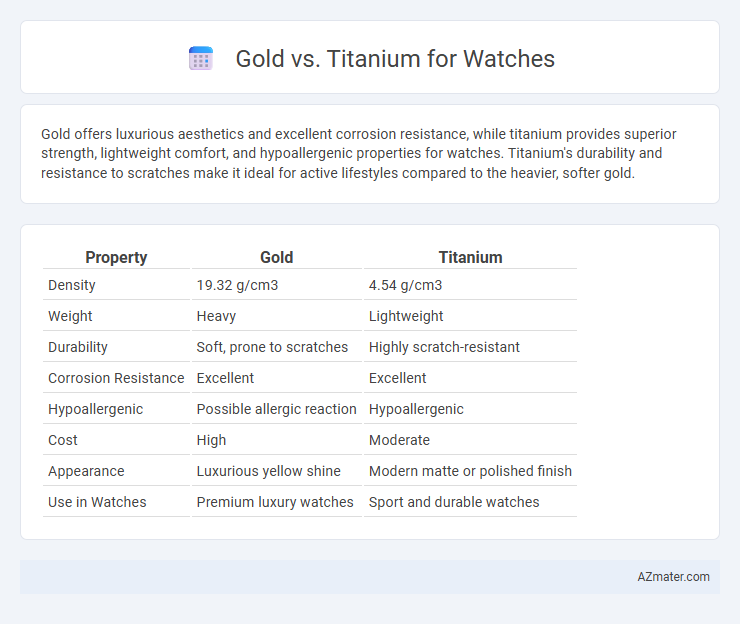Gold offers luxurious aesthetics and excellent corrosion resistance, while titanium provides superior strength, lightweight comfort, and hypoallergenic properties for watches. Titanium's durability and resistance to scratches make it ideal for active lifestyles compared to the heavier, softer gold.
Table of Comparison
| Property | Gold | Titanium |
|---|---|---|
| Density | 19.32 g/cm3 | 4.54 g/cm3 |
| Weight | Heavy | Lightweight |
| Durability | Soft, prone to scratches | Highly scratch-resistant |
| Corrosion Resistance | Excellent | Excellent |
| Hypoallergenic | Possible allergic reaction | Hypoallergenic |
| Cost | High | Moderate |
| Appearance | Luxurious yellow shine | Modern matte or polished finish |
| Use in Watches | Premium luxury watches | Sport and durable watches |
Introduction: Gold vs Titanium in Watchmaking
Gold and titanium are two prominent materials in watchmaking, each offering distinct advantages. Gold is prized for its luxurious appearance, timeless appeal, and excellent corrosion resistance, making it a classic choice for high-end watches. Titanium is favored for its exceptional strength-to-weight ratio, hypoallergenic properties, and modern aesthetic, providing durability and comfort in sports and everyday timepieces.
Historical Context: Gold and Titanium in Watches
Gold has long been revered in watchmaking for its historical association with luxury, dating back to the early 20th century when gold watches symbolized wealth and status. Titanium entered the horological scene in the late 20th century, prized for its lightweight durability and modern, industrial aesthetic, contrasting traditional precious metals. Iconic brands like Rolex and Omega pioneered titanium watches in the 1980s, revolutionizing the market by offering robust alternatives to classic gold timepieces.
Material Properties: Gold Explained
Gold offers exceptional corrosion resistance and a distinct lustrous appearance, making it a premium choice for luxury watch cases. Its high density contributes to a substantial, weighty feel that symbolizes quality and durability. The malleability of gold allows for intricate designs, while its hypoallergenic nature enhances wearer comfort.
Material Properties: Titanium Explained
Titanium offers exceptional strength-to-weight ratio, making it significantly lighter and more durable than gold, ideal for watch cases requiring toughness without added bulk. Its hypoallergenic properties and corrosion resistance ensure long-lasting comfort and resilience against environmental factors, unlike gold which is softer and prone to scratches. Titanium's matte gray finish provides a modern, understated aesthetic compared to the traditional luster of gold, appealing to users prioritizing durability and contemporary style in watches.
Durability and Strength Comparison
Gold offers a luxurious aesthetic but is significantly softer and more prone to scratches and dents compared to titanium. Titanium boasts exceptional strength-to-weight ratio, making it highly resistant to corrosion and wear while remaining lightweight for daily comfort. For durability and long-term resilience in watches, titanium outperforms gold due to its superior hardness and robustness.
Weight: Heaviness vs Lightness
Gold watches are significantly heavier due to the high density of gold, offering a substantial and luxurious feel on the wrist that many enthusiasts appreciate for its presence and prestige. Titanium, by contrast, is remarkably lightweight, providing superior comfort for extended wear without compromising strength or durability. The choice between gold and titanium often hinges on whether the wearer values a solid, weighty sensation or prefers an ultra-light, barely-there feel.
Aesthetic Appeal: Appearance and Finish
Gold watches exude luxury with their warm, lustrous sheen and polished finish, offering a classic and timeless aesthetic that enhances elegance. Titanium watches feature a sleek, modern look with a matte or brushed finish that highlights their lightweight and durable nature while providing a subtle, sophisticated appeal. The distinct color palette of gold's rich yellow tones contrasts with titanium's silvery-gray hue, influencing the overall style and visual impact of each timepiece.
Hypoallergenic Qualities and Skin Sensitivity
Titanium is highly favored for watches due to its superior hypoallergenic qualities, making it ideal for individuals with sensitive skin or metal allergies. Unlike gold, which can contain nickel or other alloys that may trigger skin irritation, titanium is biocompatible and resistant to corrosion, ensuring minimal allergic reactions. This makes titanium watches a safer and more comfortable choice for daily wear, especially for those prone to dermatological sensitivities.
Price and Value Retention
Gold watches typically command higher initial prices due to the intrinsic value of the precious metal, offering strong value retention over time driven by market demand and rarity. Titanium watches, while generally more affordable, provide exceptional durability and lightweight comfort but tend to depreciate faster as they lack the inherent precious metal value. Collectors and investors often prefer gold timepieces for their long-term value stability and potential appreciation.
Choosing Between Gold and Titanium: Which Suits You?
Gold watches offer a classic, luxurious feel with a heavier weight and a warm, rich color, making them ideal for formal occasions and those seeking timeless elegance. Titanium watches provide exceptional durability, lighter weight, and hypoallergenic properties, perfect for active lifestyles or individuals with sensitive skin. Your choice depends on whether you prioritize opulence and tradition or comfort and modern resilience in everyday wear.

Infographic: Gold vs Titanium for Watch
 azmater.com
azmater.com